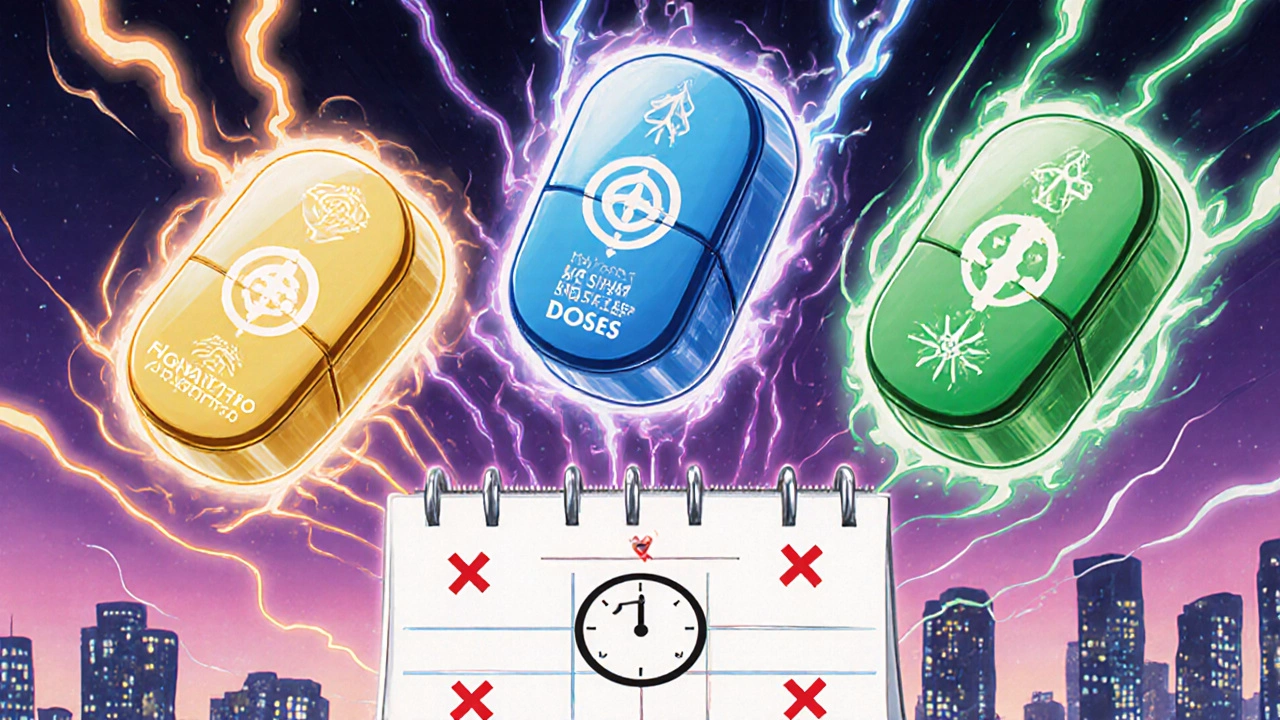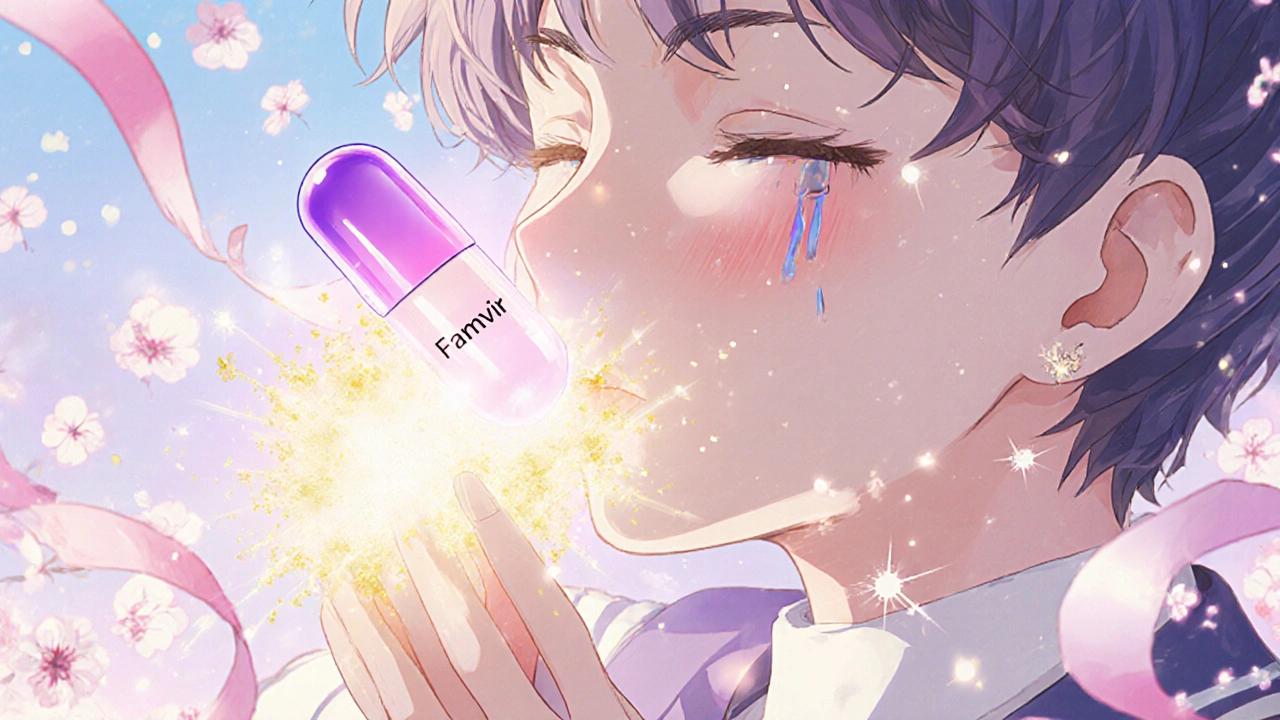Antiviral Treatment Comparison Calculator
Select Your Condition
Your Budget Preference
Your Best Treatment Options
| Medication | Dosage Schedule | Cost (NZD) | Effectiveness | Best For |
|---|
Recommendation
When you get a cold sore or feel the first tingle of shingles, time matters. Famvir (famciclovir) is one of the antiviral pills doctors often prescribe to stop herpes outbreaks before they explode. But it’s not the only option. Many people wonder: is Famvir better than acyclovir? Is valacyclovir worth the extra cost? And what about generics or over-the-counter fixes? The truth is, not all antivirals are created equal-and your best choice depends on your symptoms, budget, and how fast you need relief.
What Famvir (Famciclovir) Actually Does
Famvir is the brand name for famciclovir, a prodrug that turns into penciclovir inside your body. It works by blocking the herpes virus from copying itself. That means less blistering, less pain, and faster healing. For cold sores (oral herpes), taking Famvir within 1 hour of the first tingling can cut healing time by about 1-2 days. For shingles, starting it within 72 hours of the rash appearing reduces nerve pain and lowers the risk of postherpetic neuralgia.
Most people take Famvir as a single dose for cold sores (1,500 mg) or three times daily for 7 days for shingles. It’s absorbed quickly-peak levels hit your bloodstream in about 1 hour. That’s faster than acyclovir, which takes 2-3 hours. But speed isn’t everything. Effectiveness matters more.
Acyclovir: The Original, Still Reliable
Acyclovir was the first antiviral approved for herpes back in 1982. It’s the grandfather of this class. Today, it’s sold under brand names like Zovirax, but most people take the generic version. It’s cheaper than Famvir-often under $10 for a full course.
But here’s the catch: acyclovir doesn’t absorb well in the gut. You have to take it 5 times a day for shingles. That’s a hassle. For cold sores, you still need 3-5 doses daily. Missing a dose means the virus gets a chance to rebound. Famvir, by contrast, is taken just once or twice a day. That’s why many doctors prefer it for busy patients.
Studies show acyclovir and famciclovir work about the same in healing time and pain reduction. But Famvir’s dosing schedule makes it easier to stick with. If you’re on a tight budget and don’t mind frequent pills, acyclovir still works fine.
Valacyclovir: The Middle Ground
Valacyclovir (brand: Valtrex) is a prodrug too-it turns into acyclovir after you swallow it. It’s a hybrid of the two: better absorption than acyclovir, simpler dosing than Famvir.
For cold sores, you take 2,000 mg twice a day, 12 hours apart. For shingles, it’s 1,000 mg three times daily for 7 days. That’s fewer pills than acyclovir, but one more daily dose than Famvir. In real life, people find valacyclovir easier than acyclovir but slightly less convenient than Famvir.
Research from the Journal of the American Academy of Dermatology shows valacyclovir and famciclovir have nearly identical healing times for both cold sores and shingles. But valacyclovir is often more expensive than generic famciclovir. In New Zealand, a 7-day course of generic famciclovir costs about $35. Valacyclovir runs closer to $70 without subsidy.

Other Options: Topicals, OTC, and Natural Remedies
Some people skip pills entirely and reach for creams. Docosanol (Abreva) is the only FDA-approved OTC topical for cold sores. It can shorten healing by half a day to a day-but only if you start applying it at the first sign. It doesn’t work on shingles.
Lysine supplements are popular online. Some claim they reduce outbreaks. But a 2021 review in Cochrane Database of Systematic Reviews found no strong evidence lysine prevents or treats herpes. Same goes for tea tree oil, aloe vera, or zinc ointments. They might soothe skin, but they don’t stop the virus.
For shingles, nothing beats antivirals. Topicals won’t touch the nerve pain. If you’re over 50, getting the Shingrix vaccine is the best long-term protection. But once the rash appears, antivirals are your only medical tool.
Cost, Availability, and Insurance
In New Zealand, Famvir is subsidized under the Pharmaceutical Schedule. With a prescription, you pay $5 per prescription item-same as most generics. That makes generic famciclovir the cheapest option by far.
Valacyclovir is also subsidized, but it’s not always the first choice for pharmacists because it’s pricier than famciclovir. Acyclovir is the cheapest of all, but you’ll need to take it more often.
Insurance in the U.S. often favors valacyclovir because of dosing convenience. But in countries with public drug plans like New Zealand, Australia, or Canada, famciclovir wins on cost and simplicity.
Side Effects and Safety
All three antivirals-famciclovir, valacyclovir, and acyclovir-are very safe. Most people feel nothing. The most common side effects are mild: headache, nausea, or dizziness. Kidney problems are rare but possible, especially in older adults or those with existing kidney disease.
Famvir has one small edge: it’s less likely to cause dizziness than valacyclovir, according to patient reports collected by the New Zealand Adverse Drug Reactions Centre. For people who drive or operate machinery, that matters.
All three are safe during pregnancy and breastfeeding. The CDC and WHO list them as preferred options for herpes in pregnant women. No need to avoid them if you’re expecting.

Which One Should You Pick?
Here’s a simple guide:
- For cold sores, on a budget, and don’t mind 2-3 pills a day? Go with generic acyclovir.
- Want the fewest pills, fastest absorption, and lowest out-of-pocket cost? Famvir (famciclovir) is your best bet.
- Prefer a brand-name drug with strong insurance coverage? Valacyclovir works just as well, but you’ll pay more.
- Just got a rash and it’s been over 72 hours? Antivirals won’t help much anymore. Focus on pain relief and see your doctor for nerve pain management.
There’s no "best" drug-only the best for you. If you’ve tried one and it didn’t work, don’t assume they all fail. Switching between them can make a difference.
When to Call Your Doctor
Antivirals work best when started early. But you should still call your doctor if:
- Your cold sore lasts longer than 2 weeks
- The rash spreads beyond one area or affects your eyes
- You have a weakened immune system (HIV, chemo, transplant)
- You’re pregnant and have your first herpes outbreak
- You get shingles under age 50-it’s unusual and needs checking
Don’t wait for symptoms to get worse. Early treatment means less pain, fewer blisters, and a lower chance of long-term nerve damage.
Is famciclovir better than acyclovir for cold sores?
Famciclovir and acyclovir work just as well at healing cold sores. But famciclovir is taken as a single dose, while acyclovir needs 3-5 doses a day. That makes famciclovir easier to use. If you’re consistent with dosing, acyclovir still works fine-especially if you’re paying out of pocket.
Can I buy famciclovir over the counter?
No. Famciclovir is a prescription-only medicine in New Zealand, the U.S., and most countries. You can’t buy it at pharmacies without a doctor’s note. This is because antivirals need proper timing and dosing to be effective and safe.
Is there a generic version of Famvir?
Yes. The generic is called famciclovir. It’s chemically identical to the brand-name Famvir and costs a fraction of the price. In New Zealand, it’s subsidized, so you pay just $5 per prescription. Most pharmacies stock it.
Does famciclovir prevent future outbreaks?
No. Famciclovir treats active outbreaks but doesn’t cure herpes or stop future ones. For frequent outbreaks (6+ per year), your doctor may prescribe daily suppressive therapy. That can reduce outbreaks by 70-80%. But it’s not the same as prevention.
Can I take famciclovir with other meds?
Famciclovir has few interactions. But avoid it with probenecid (used for gout), as it can raise famciclovir levels. Always tell your doctor about all your meds-especially kidney drugs, chemotherapy, or immunosuppressants. Most common painkillers and cold meds are safe to take with it.
Final Thoughts
Famvir (famciclovir) isn’t magic. But it’s one of the most practical tools we have for herpes outbreaks. It’s fast, simple, cheap, and effective. Valacyclovir is close behind, but costs more. Acyclovir works, but demands discipline. And nothing replaces early action.
If you get cold sores often, keep a prescription on hand. Don’t wait until you’re in pain to call your doctor. For shingles, act within 72 hours-every hour counts. And remember: no pill stops the virus forever. But the right one at the right time can mean the difference between a week of discomfort and a month of pain.

Penny Clark
October 29, 2025 AT 22:26I’ve been using famciclovir for years after my first shingles episode at 32-crazy, right? 🤯 It cut my pain in half and I didn’t miss a day of work. The single dose for cold sores is a game changer when you’re rushing out the door. I keep a bottle in my purse like lip balm. No more hiding under scarves.
Niki Tiki
October 31, 2025 AT 09:46Why are we even talking about this like it’s a luxury? Acyclovir’s been around since my grandma was young and it works fine. You’re just paying for convenience. I’ve been taking generic acyclovir since 2010 and I’m still standing. Stop falling for pharma marketing. 💪
Jim Allen
October 31, 2025 AT 18:25Look I get it famciclovir’s convenient but honestly? It’s just a fancy pill with a better ad campaign. We’re talking about a virus that’s been around since cavemen. You think a 12-hour dosing schedule is gonna change your life? 😴 I take my acyclovir like a champ. Five times a day. No complaints. Maybe if you stopped being lazy you wouldn’t need the expensive stuff.
Nate Girard
November 1, 2025 AT 13:31Just had my first cold sore in 5 years and tried famciclovir for the first time-OMG it was like magic. Took it at the first tingle and by the next day it was just a red spot. I was skeptical but now I’m a believer. Also found out my insurance covers it for $5 copay! If you’ve been avoiding it because of cost-please reconsider. It’s worth it. 🙌
Carolyn Kiger
November 2, 2025 AT 19:53As someone who’s lived in 5 countries, I’ve seen how different places handle this. In India, everyone uses acyclovir because it’s cheap and accessible. In Canada, valacyclovir is the go-to. Here in the US, it’s all about convenience. But the science? It’s the same. The real win is catching it early. Don’t wait until it’s a full blister.
krishna raut
November 2, 2025 AT 20:52Generic famciclovir works same as brand. Cost $2 in India. No need to pay more. Take at first sign. Done.
Prakash pawar
November 4, 2025 AT 02:21People are so obsessed with pills these days. You know what really stops herpes? Clean living. No stress. No sugar. No late nights. You think a chemical is gonna fix your chaotic life? 🤡 I’ve had cold sores since I was 14 and I never took a single pill. Just drank water. Slept early. And guess what? Outbreaks got rarer. The real medicine is discipline. Not a prescription.
MOLLY SURNO
November 4, 2025 AT 10:21Thank you for the detailed breakdown. I’ve been hesitant to use antivirals because I assumed they were all the same. This clarified the real differences in dosing, cost, and accessibility-especially for people on public health systems. I’ll be keeping this as a reference for my aging parents who’ve had shingles twice. The note about pregnancy safety is especially helpful.